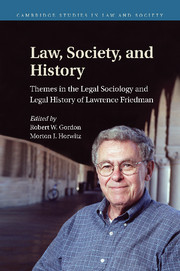Book contents
- Frontmatter
- Contents
- Contributors
- Introduction
- PART I OVERVIEWS AND ASSESSMENTS OF FRIEDMAN'S WORK
- PART II APPLICATIONS OF CONCEPTS, INSIGHTS, AND METHODS IN FRIEDMAN'S WORK
- PART III THE LEGAL PROFESSION
- PART IV LAW AND LARGE AREAS OF SOCIAL LIFE
- PART V FACTS FROM THE UNDERGROUND: DIGGING LEGAL HISTORY OUT OF THE CELLAR
- PART VI PERSPECTIVES FROM OTHER CONCEPTUAL WORLDS
- Index
- Titles in the series
Introduction
Published online by Cambridge University Press: 07 October 2011
- Frontmatter
- Contents
- Contributors
- Introduction
- PART I OVERVIEWS AND ASSESSMENTS OF FRIEDMAN'S WORK
- PART II APPLICATIONS OF CONCEPTS, INSIGHTS, AND METHODS IN FRIEDMAN'S WORK
- PART III THE LEGAL PROFESSION
- PART IV LAW AND LARGE AREAS OF SOCIAL LIFE
- PART V FACTS FROM THE UNDERGROUND: DIGGING LEGAL HISTORY OUT OF THE CELLAR
- PART VI PERSPECTIVES FROM OTHER CONCEPTUAL WORLDS
- Index
- Titles in the series
Summary
The chapters in this volume approach and bounce off a common object from many different angles. That object is the set of concepts, themes, methods, and conclusions in the work of one of the most influential and productive scholars of law and society, Lawrence M. Friedman of Stanford University. The authors are an international cast of distinguished scholars of law and society: legal sociologists, legal historians, and students of comparative law. This book is not a Festschrift in the usual sense of a collection of miscellaneous essays by colleagues and disciplines assembled to honor a great scholar. Rather it is a sustained examination and application of the scholar's ideas and methods. Some of the writers directly assess and comment on Friedman's vast body of work. Some examine his conclusions to see how well they have stood up over time. Others apply concepts and insights derived from Friedman's work to the study of similar problems in different periods and societies. Still others use Friedman's concepts and insights as a foil or contrast to their own approaches to studying law and society from theoretical perspectives very different from his.
We should say a few words first about the extraordinary man whose ideas and their applications are the centerpiece of this volume. Lawrence M. Friedman was born in Chicago in 1930. He received a B.A. at the age of 18, a J.D. at 21, and an LL.M. at age 23, all from the University of Chicago.
- Type
- Chapter
- Information
- Law, Society, and HistoryThemes in the Legal Sociology and Legal History of Lawrence M. Friedman, pp. 1 - 16Publisher: Cambridge University PressPrint publication year: 2011



